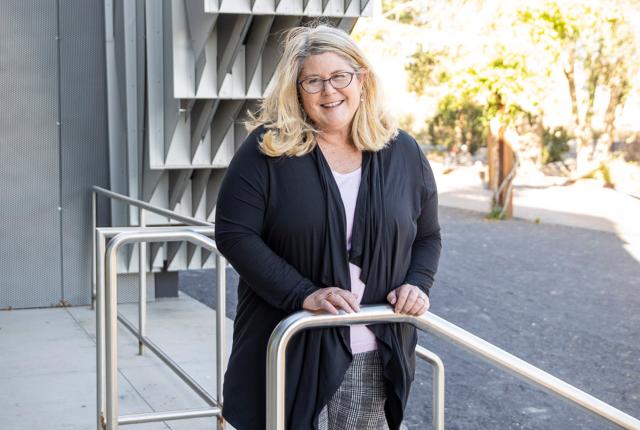Founder of Girls in STEM, Elizabeth Coronado helps get middle school girls interested in science, technology, engineering and math. Photograph by Gabriella Marks.
AT THEIR 2019 SUMMER CAMP, nine middle school girls were suddenly nuclear physicists. Representing countries like Iraq and Iran in this scenario run by the Girls in STEM project, the young women had to calculate the amount of “plutonium” powder in their paper cups. Armed with this knowledge, they attempted to persuade a mock International Atomic Energy Agency that they had calculated correctly.
“Never in their wildest dreams had they imagined they could have developed something so sophisticated in such a short amount of time,” says Elizabeth Coronado, founder of Girls in STEM. “Not only were they successful in their calculations; their diplomacy gave them self-efficacy. Once you experience success, it’s almost addictive. They strive for it again to feel that rush.”
Coronado, who is a senior training specialist for safety at Los Alamos National Laboratory, created Girls in STEM to research changes in young women’s opinions toward science, technology, engineering, and mathematics—fields in which women have historically been underrepresented—and their likelihood to choose those courses of study and careers. Unlike other such programs, Girls in STEM gets girls interested early, when they’re in sixth grade, and creates mentorships lasting through high school.
Coronado’s inspiration began with her own STEM experiences. As an undergraduate and doctoral student, she had to reach out to men in the field for help with sophisticated statistics. “Why is it that the only people who can or are willing to help me are male? Something’s not right about this,” the New York native remembers.
When she moved from the educational field to LANL, she wanted to show other women and girls that STEM fields were a place for them and that others were already succeeding there. Additionally, she believed that fostering more women in STEM fields would benefit those professions.
“Women have a different approach,” she says. “Bringing in these different perspectives can only complement the heretofore methodology that one gender has brought.” Although she’s received support from the lab, which allows employees time for community service, and funding from the LANL Foundation, she created Girls in STEM outside of her day job.
Three years ago, Girls in STEM selected a cohort of nine girls from Abiquiú Elementary, in rural Río Arriba County, who represent some of the most vulnerable populations in northern New Mexico. Many of the young women have faced obstacles such as an incarcerated parent, foster care, and homelessness.
They come together weekly via a Snapchat group. Mentors are available for questions about anything, whether it’s help with homework or advice about navigating high school. They also meet quarterly (when not navigating COVID-19) at Girls Inc. of Santa Fe.
Although the study isn’t complete, Coronado has seen encouraging results. The young women requested a second summer camp. In addition to their usual camp in 2021, they’ll become the teachers for the second session.
Mentor Victoria Coronado, a senior engineering student at the University of New Mexico and Elizabeth’s niece, has seen interest grow among the mentees as they’ve made connections between the real world and STEM via a ropes course (physics) and music (math and sound engineering). She’s also seen Elizabeth, who received a 2019 Los Alamos National Laboratory Distinguished Performance Award, go above and beyond, “simply by being there as a support.”
“The only way that we’re going to change some of the hardships that rural areas experience is to invest our time and our talent into young people to let them know that they’re valued, loved unconditionally, and they mean something in this world,” Elizabeth says. “I know that our girls now know this.”


